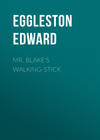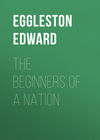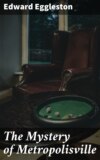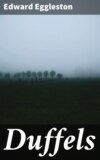Buch lesen: «The Graysons: A Story of Illinois», Seite 8
XII
A TRIP TO BROAD RUN
As the wagon disappeared, Bob called to his daughter, who had been left in charge.
"Mely! Mely! You jes stir up the kitchen fire there, honey, un bile me a cup of coffee, agin I go home un fetch my gun wi' the dogs, un come back." (Bob knew there was no coffee at home.) "I'm a-goin' over onto Broad Run arter bears."
"Aw, now, pap, you're all-ays off fer a hunt at the wrong time. Don' choo go away now, un the folks in sech a world uh trouble. Un besides, mammy hain't got anough to eat in the house to do tell you come back." All this Mely said in a minor key of protest, which she had learned from her mother, who was ever objecting in a good-natured, pathetic, impotent way to her husband's thriftless propensities.
"I know what I'm up to, Mely. They's reasons, un the schoolmaster knows'em. You keep your tongue still in yer head, honey. On'y be shore to remember, 'f anybody axes about me, 't I'm arter bears. Jes say't bears uz been seed over onto Broad Run, un't pap couldn't noways keep still, he wuz so sot on goin' over 'n' sayin' howdy to 'em. That'll soun' like me, un folks 'll never mistrust."
"But mammy hain't akchelly got anough fer the children to eat," responded Mely.
"Well, I 'low to fetch some bear meat home, un you kin borry some meal from Mrs. Grayson's bar'el tell I git back. 'F they knowed what kind uh varmints I wuz arter over there, they wouldn't begrudge me nuthin', Sis. Come, now, hump yer stumps; fer I'll be back in a leetle less'n no time."
And Bob went off in the darkness. In about a dozen minutes he returned with his powder-horn slung about his shoulders over his hunting-shirt and carrying his rifle. He was closely followed by Pup, Joe, and Seizer, his three dogs, whose nervous agitation, as they nosed the ground in every direction, contrasted well with the massive stride of their master. Having swallowed such a breakfast as Mely could get him out of Mrs. Grayson's stores, and put a pone of cold corn-bread into the bosom of his hunting-shirt, McCord was off for the Broad Run region at the very first horizon-streak of daybreak. Though game was but a secondary object in this expedition, he could not but feel an exhilaration which was never wanting when he set out in the early morning with his gun on his shoulder and in the congenial companionship of his dogs. Hercules or Samson could hardly have rejoiced in a greater assurance of physical superiority to all antagonists. The most marked trait in Bob's mental outfit was the hunter's cunning, a craft that took delight in tricks on man and beast. The fact that he was akin to some of the families on Broad Run enhanced the pleasure he felt in his present scheme to get the better of them. He would "l'arn the Broad Run boys a thing or two that'd open their eyes." His great plump form shook with merriment at the thought. Plovers rose beating the air and whistling in the morning light as he passed, and the dogs flushed more than one flock of young prairie-chickens, which went whirring away just skimming the heads of the grass in low level flight, but Bob's ammunition was not to be spent on small game this morning. By 7 o'clock the increasing heat of the sun made the wide, half-parched plain quiver unsteadily to the vision. The sear August prairie had hardened itself against the heat – the grass and the ox-eyes held their heads up without sign of withering or misgiving: these stiff prairie plants never wilt – they die in their boots. But the foliage of the forest which Bob skirted by this time appeared to droop in very expectation of the long oppressive hours of breathless heat yet to come. In this still air even the uneasy rocking poplar-leaves were almost stationary on their edge-wise stems.
Steady walking for more than three hours had brought Bob to the outskirts of the Broad Run region, and had sobered the dogs; these now sought fondly every little bit of shade, and lolled their tongues continuously. The first person that Bob McCord encountered after entering the grateful region of shadow was one Britton – "ole man Britton," his neighbors called him. This old settler led a rather secluded life. Neither he nor his wife ever left home to attend meetings or to share in any social assembly. They had no relatives among the people of the country, and there was a suspicion of mystery about them that piqued curiosity. Some years before, a traveler, in passing through the country, gave out that he recognized Britton, by his name and features, as one whom he had known in Virginia, where he said Britton had been an overseer and had run away with his employer's wife. The neighbors had never accepted the traveler's story in this way; though they were ready to believe that the woman might have run away with Britton. When Bob came in sight of him the saturnine old man was standing looking over the brink of a cliff into a narrow valley through which coursed the waters of Broad Run, steadying himself meanwhile by a sapling. Bob, following his first impulse, deposited his gun, beckoned his close-following little dog back, and crept stealthily towards Britton, keeping a tree between him and the old man when he could. Arrived in reach he made a spring, and laying firm hold of his victim by grasping him under the arms, he held him for a moment over the edge of the precipice. Then he brought him back and set him safely down as one might a child, and said innocently:
"W'y, Mr. Britton, I do declare, 'f I hadn't'a' cotcht you, you'd'a' fell off!"
The shriveled old man drew back to a safe distance from the brink, and tried to force his insipid face into a smile, but he was pale from the deadly fright. Big Bob rubbed his legs and gave way to a spasm of boisterous boyish laughter.
"Seed any bear signs 'round about, Mr. Britton?" he said, when his laugh had died into a broad grin.
"No."
"What wuz you lookin' over the cliff fer?"
"Zeke Tucker. He's workin' fer me, an' he's been gone all the mornin' arter my clay-bank hoss. I'm afeard sumpin's happened."
"'F I find him I'll set the dogs onto him an' hurry him up a leetle," said Bob, laughing again and going on, intent now on encountering Zeke, alone, for purposes of his own.
Then, when he had gone a little way, he stopped and looked back at the retreating old man, and grinned as he noted the doleful way in which his over-large trousers bagged behind.
"Mr. Britton," he called, "which way'd Zeke go?"
"Up the crick; the hoss is up thar sumers."
Having secured this information, Bob went on, descending the cliff to the valley through which Broad Run rattled its shallow waters – a valley so broken and rugged as to render it almost unfit for cultivation. This glen was settled, as such regions are wont to be, by a race of "poor whiteys," or rather by a mixture of people belonging to two stocks originally different. The one race was descended from the lowest of the nomads, vagrants, and other poverty-stricken outcasts that had been spirited away from England by means legal and illegal, to be sold for a long term into bondage in the American colonies; the other, from the roughest wing of the great Scotch-Irish immigration of the last century – the hereditary borderers who early fought their way into the valleys and passes of the Alleghanies. Equally thriftless in their habits, and equally without any traditions of their origin, members of these two tribes mingled easily. The people in whom the Scotch-Irish blood preponderates are more given to violence, but their humor, their courage, and their occasional bursts of energy indicate that they have a chance of emerging from barbarism; while the poor whiteys of English descent are most of them beyond the reach of evolution, foreordained to extinction by natural selection, whenever the pressure of overpopulation shall force them into the competition for existence.
With that instinctive unthriftiness which is the perpetual characteristic of the poor whitey in all his generations, the Broad Run people had chosen the least inviting lands within a hundred miles for their settlement, as though afraid that by acquiring valuable homes they might lose their aptitude for migration; or afraid, perhaps, that fertile prairies might tempt them to toil. The convenience of a brook by their doors, and a wood that was uncommonly "handy," had probably determined their choice. Then, too, the circumjacent cliffs gave them a sense of being shut in from prairie winds, and put some limit to the wanderings of their half-starved "critters." For the rest, their demands upon the land were always very modest – a few bushels of "taters," for roasting in the ashes; a small field of maize, for roasting-ears, hominy, and corn-dodgers; and such pumpkins and beans as could be grown intermingled with the hills of corn, were about all that one of these primitive families required, beyond what could be got with a gun or a fishing-line. The only real luxuries affected were onions and melons – "ing-uns un watermillions," in Broad Run phrase. Their few pigs and cows ran at large, and lived as they could. Oxen they rarely owned, but whenever a man was in the least prosperous he was sure to possess a single inferior saddle-horse, though he sometimes had no saddle but a blanket girt with a surcingle. A horse was kept at the service of neighbors; for, like other savages, the Broad Run people were hospitable and generous to members of their own tribe, and the only economy they understood was that of borrowing and lending, by which a number of families were able to make use of the same necessary articles. This happy device, for example, enabled one circulating flat-iron to serve an entire neighborhood.
The Broad Run people entertained a contempt for the law that may have been derived from ancestors transported for petty felonies. It seemed to them something made in the interest of attorneys and men of property. A person mean enough to "take the law onto" his neighbor was accounted too "triflin'" to be respectable; good whole-souled men settled their troubles with nature's weapons, – fists, teeth, and finger-nails, – and very rarely, when the offense was heinous and capital, with bullets or buckshot. Men who were habitually disgraceful in any way – as, for example, those who could not get drunk without beating their wives – were punished, without the delay of trial, by the infliction of penalties more ancient than statutes, such as ducking, riding on a rail, whipping, or sudden banishment. Hanging by lynch-law was reserved for the two great crimes of horse-stealing and murder.
They put the killing of George Lockwood into the category of grudge-murder, since he was shot at night "without giving him a show for his life." But the shooting did not immediately concern Broad Run, and Broad Run folks would not have felt themselves responsible for seeing justice done, if it had not been for concurring circumstances. Lynch law is an outbreak of the reformatory spirit among people of low or recent civilization. Like other movements for reform, it is often carried by its own momentum into unforeseen excesses. It had happened recently that two brothers, thieves of the worst class, who had infested the country and had long managed to escape from the law, had been sent to prison for four years. They were believed to be guilty of an offense much blacker than the robbery for which they were sentenced; but the murder of a strange peddler had escaped notice until the body had been discovered two years after the crime, and the crime could not then be brought home by legal evidence. Their attorney, a lawyer notorious for chicanery, had, by appeal, got a new trial on account of some technical error in the proceedings of the lower court. The county had already been heavily taxed to defray the expense of convicting them, and the people were exasperated by the prospect of a new expense with the possible escape of the criminals. Public expenses, it is true, sat lightly on Broad Run; the taxes levied on its barren patches and squalid cabins were not considerable, but Broad Run made much of the taxes it did pay, and it caught the popular indignation, and was indignant in its own prompt and executive fashion. The very night before the new trial was to begin, the doors of the jail were forced, and the two prisoners were shot to death by a mob. On the jail door was left a notice, warning the attorney of the criminals to depart from the county within thirty hours, on pain of suffering a like fate. Though Broad Run got most of the credit for this prompt vindication of justice, the leaving of this legible notice upon the door was taken as evidence of the complicity of some whose education was better than that of the settlers at the Run. This execution had taken place but three months before the shooting of George Lockwood, and the mob was like a were-wolf. Perhaps I ought rather to liken it to those professional reformers who, having abolished slavery, or waved their hats while others abolished it, proceed to inquire for the next case on the docket, and undertake forthwith to do away with capital punishment or the marriage relation. Having found its local self-complacency much increased by success in discovering a method cheaper and more expeditious than those of the courts, Broad Run was readily inclined to apply its system of criminal jurisprudence to a new case.
But this local reformatory tendency, like many large movements of the sort, was very capable of lending itself to the promotion of personal aims and the satisfaction of private grudges. One of Tom Grayson's rash boyish exploits, soon after he took up his abode with his uncle in town, had been to avenge himself for an affront put upon him the year before by Jake Hogan of Broad Run. Jake, while working as a hired man for Butts, the next neighbor to the Graysons, had taken the side of his employer in the long-standing quarrel between the Buttses and the Graysons about pigs in the corn-field and geese in the meadow, "breachy" horses and line fences. Jake had gone so far one day as to throw Tom, then a half-grown boy, into the "branch." A boy's memory of such events is good, and when Jake rode into Moscow, a year later, in company with his sweetheart to see the circus, Tom repaid the old grudge by taking the stirrups from Jake's saddle and dropping them into the public well; so that the consequential Jake had the mortification of escorting a giggling Broad Run girl to her home with his lank legs and his big boots dangling, unsupported, against the flanks of his horse. Hogan would have beaten Tom, if he had not received an intimation that this would perhaps involve the necessity of his settling the matter a second time with big Bob McCord. But he laid up his grudge, and from that time he had taken pleasure in testifying to his settled conviction that Tom "wouldn' never come t' no good eend." He always lent emphasis to this sinister prediction by jerking his head back, with the self-confident air of a man who knows what he knows. From the moment of the shooting of Lockwood, when Jake found that Tom was on the direct road to the gallows, he began to twit all his cronies.
"Hain't I all-ays said so? Go to thunder! D'yeh think Jake Hogan don't know a feller as the rope's already got a slip-knot onto?" And he would jerk his chin back, and stiffen his neck, as he defiantly waited for a reply.
Not content with exulting in successful prophecy, Jake got a notion from the first that it devolved on him now to see that this young scapegrace should not fail of merited punishment. His neighbors at the Run, having boasted much of the value of what they called "Broad Run law," were willing to add a leaf to their laurels as reformers of the county; and he counted also on finding recruits among the loafers on the outskirts of the camp-meeting, if the coroner's jury should return a verdict adverse to Tom.
Bob McCord was able to conjecture something of this state of affairs from the slender information the schoolmaster had given him. During all his morning's walk to Broad Run, Bob's thoughts had chiefly revolved about plans for circumventing Hogan. His first crude scheme was to join the reformers in their little excursion, and then mislead or betray them; but his friendly relations with the Graysons were too well known to Jake for this to be possible. It was not until the old man Britton had mentioned Zeke Tucker that there occurred to Bob's inventive mind a proper agent for his purpose. Wishing to have his coming known, he steered his course near to the rickety cabin of Eleazar Brown, or, as he was commonly called, "Ole Lazar Brown."
"G'-mornin', S'manthy," Bob called to Lazar Brown's daughter, at the same time giving his head a little forward jerk, – the very vanishing point of a bow, – but without stopping his march. S'manthy had buried two husbands, and had borne eight white-headed children, but she had never been called by any other name than S'manthy. Just now she was "batting" clothes on a block in front of the house, turning a wet garment over with her left hand from time to time, and giving it the most vindictive blows with a bat held in her right.
"Y' ain't heern nothin' 'v no bears a-cap'rin' 'round h-yer lately, eh?' Bob asked, relaxing his gait a little.
"They say as they's a b'ar been seed furder upt the run, un I 'low you mout fine some thar ur tharabouts," replied the woman, intermitting her batting a moment and pushing back her faded pink sun-bonnet. "But wha' choo doin' away f'om home, I'd thes like to know, when they's so much a-goin' on in your diggin's? They say you've had a murder 'n' all that."
"I don't talk, S'manthy. I'm a-lookin' fer bears. They 's times when yo'd orter hole onto yer tongue with both uh yore han's."
Bob quickened his stride again and was soon out of sight among the scrubby trees of the rugged valley.
"I say, daddy!" called S'manthy, when Bob had had time to get out of hearing; "looky h-yer, daddy!"
Old Lazar Brown, in answer to this call, came and stood in the door, taking his cob-pipe from his mouth with his shaky hand and regarding his daughter.
"Big Bob McCord's thes gone along upt the run a-hunt-in' fer b'ars," said S'manthy. "Un they say as the feller that killed t' other feller las' night's the son uh the woman 't 'e works fer. Bob's the beatinest hunter! Ef Gaberl wuz to toot his horn, Bob'd ax him to hole on long anough fer him to git thes one more b'ar, I'll bet."
Lazar Brown had shaking-palsy in his arms, and, being good for nothing else, could devote his entire time to his congenial pursuits as gossip and wonder-monger of the neighborhood. Having listened attentively to S'manthy, he shook his head incredulously.
"Yeh don't think ez he's arter b'ars, do yeh, S'manthy? Bob's got some trick er 'nother 'n 'is head. W'y, thes you look, he mus' uh le't home afore daybreak. Now, Bob'd natterly go to the carner's eenques' to-day, whar they'll be a-haulin' that young feller up that shot t' other feller las' night. Big Bob's got some ornery trick 'n 'is head." Here Lazar Brown stopped to replace his pipe in his mouth. He was obliged to use both hands, but after two or three attempts he succeeded. "Looky h-yer, S'manthy, you thes keep one eye out fer Bob; I 'low he'll go down the run towurds ev'nin'. He'll be orful dry by that time, fer he's one of the driest fellers. Thes you tell him 't I've got a full jug, un ax him in, un we'll kind-uh twis' it out uh'im. I 'low I'll go 'n find Jake."
Lazar returned to the house, knocked the ashes out of his pipe and refilled it. Then with some difficulty he succeeded in taking a live coal from the ashes; holding it in the leathery palm of his shaking left hand, he got it deposited at last on the corn-cob bowl of his pipe. As soon as this operation of firing-up was completed, he set out in a trotty little walk, glad to have news that would make the neighbors hearken to him.
Meantime Bob McCord, having passed out of sight of S'manthy in his progress up the creek, had faced about and come back through the bushes to a point overlooking Lazar Brown's cabin, where, in a dense patch of pawpaws, he stood in concealment. This movement greatly perplexed the old dog Pup, who stood twitching his nose nervously, unable to discover what was the game that had attracted his master's eye. When at length Bob saw Lazar start off down the run, he smote his knee with his hand and gave vent to half-smothered laughter.
"Tuck like the measles!" he soliloquized. "Un it'll spread too. See 'f it don't! Come, Pup – bears! bears! ole boy!"1
The dogs took the hint and ceased their nosing about the roots of trees for squirrels, and in beds of leaves and bunches of grass for hares. They began to make large circles through the trees about Bob, who moved forward as the center of a sort of planetary system, the short-legged dog keeping near the center, while Pup ranged as far away as he could without losing sight of his master, – the remote Uranus of the hunt. Joe, having "tairrier" blood in him, ran with his nozzle down; but long-legged Pup, with a touch of greyhound in his build, carried his head high and depended on his eyes. The fact that Tom Grayson's life was at stake afforded no reason, in Bob's view, for giving over the pursuit of bears. Nor did he hunt in serious earnest merely because there was neither bread nor meat at home. A cat will catch mice for the mere fun of it, and with Bob the chase was ever the chief interest of life. But Bob did not forget his other errand; while the dogs were seeking for bears, he was eagerly scanning the bushes in every direction for Zeke Tucker. Half a mile above Lazar Brown's he encountered Zeke, carrying a blind-bridle on his arm, and still looking in vain for Britton's stray horse.
"Hello, Zeke! the very feller I wuz a-lookin' fer. Don't ax me no questions about what I'm a-doin' over h-yer, an' I won't tell you no lies. Let's set down a minute on that air hackberry log."
The writer of a local guide-book to the city of Genoa recounts, among the evidences of piety exhibited by his fellow-citizens, the hospital built by them for those "la quale non è conceduto di bearsi nel sorriso di un padre." Zeke was one of those to whom, in the circumlocution of the Genoese writer, had not been granted the benediction of a father's smile. Such unfortunates were never wanting in a community like Broad Run, but no one had ever thought of building an asylum for them, though there were many ready to make them suffer the odium of sins not their own. From that unexpected streak of delicacy which is sometimes found in a rough man of large mold, Bob McCord had always refrained from allusion to the irregularity of Zeke's paternity, and had frequently awed into silence those who found pleasure in jibing him. This had awakened in Zeke a grateful adhesion to Bob, and in the young man's isolation among his neighbors and his attachment to himself Bob saw a chance to secure an ally.
"Zeke," said McCord, when once they were seated on the hackberry log, "you 'n' me's all-ays been frien's, hain't we?"
"Toobshore, Bob! they hain't no man a-livin' I'd do a turn fer quicker."
"Well, now, you tell me this: Is Jake Hogan a-goin' to town weth the boys to-night?"
"I hadn't no ways orter tell, but I 'low 't 'e is."
"You a-goin' along?"
"I dunno. 'F you don't want me to, I don't reckon ez I shall."
"Yes, but I'd ruther you 'd go. I don't want that air fool boy hung 'thout a fair stan'-up trial, 'n' I may as well tell you 't I don't mean he shall be nuther, not 'f I have to lick Jake Hogan tell his ornery good-fer-nothin' hide won't hold shucks. But don't choo tell him a word 't I say."
"Trust me." Zeke was pleased to find himself in important confidential relations with a man so much "looked up to" as Bob McCord. "Jake 's been the hardest on me 'v all the folks, un they 's been times when I 'lowed to pull up un cl'ar out for the Injun country, to git shed uv 'im. I wish to thunder you would lick him 'thin 'n inch 'viz life. He's a darn-sight wuss 'n git out."
"Looky h-yer, Zeke; I'll tell you how you kin git even with Jake. You jest go 'long weth the boys to-night, wherever they go. I'm goin' to fix it so's they won't do nuthin' to-night. You're livin' 't ole man Britton's now, ainch yeh?"
"Yes."
"Well, you git off fer half a day f'om Britton's, un go to the eenques' this arternoon, un fine out all you kin. Arter supper, you go over to the groc'ry; un jest as soon's you fine out whech way the wind sets, you've got to let me know. 'T won't do fer me to be seed a-talkin' to you, ur fer me to loaf aroun' Britton's. But ef Jake makes up his mine to go to Moscow, you light a candle to-night un put it in the lof' where you sleep, so 't 'll shine out uv a crack on the south side uv the chimbley, in the furder eend uv the house."
"But his mine 's already made up," said Zeke.
"They's time to change afore night. Ef he's goin' to Perrysburg – "
"Perrysburg? They ain't no talk uv Perrysburg," said Zeke.
"They may be," answered Bob. "Un ef Perrysburg's the place, you put the candle at the leetle winder on the north side uv the chimbley. Un when I shoot you put out the candle, un then I'll know it's you, un you'll know 't I understan'. You see, 't won't do fer me to stop any nearder 'n the hill, un I'll wait there till I see your candle. Then you go weth Jake." Here Bob got up and strained his longsighted eyes at some object in the bushes on the other side of the brook. "Is yon hoss yourn, on t' other side of the branch?"
"I don't see no hoss," said Zeke.
"Well, you watch out a minute un you'll ketch sight uv 'im. He's gone in there to git shed of the flies."
"That's our clay-bank, I believe," said Zeke, getting up and carefully scanning the now half-visible horse.
"Mine! you hain't seen nor heern tell of me, un you b'long to Jake's crowd weth all your might."
With these words Bob set out again for his bear-hunt, while the barefoot Zeke waded through the stream, which was knee-deep, and set himself to beguile Britton's clay-bank horse into standing still and forfeiting his liberty.















